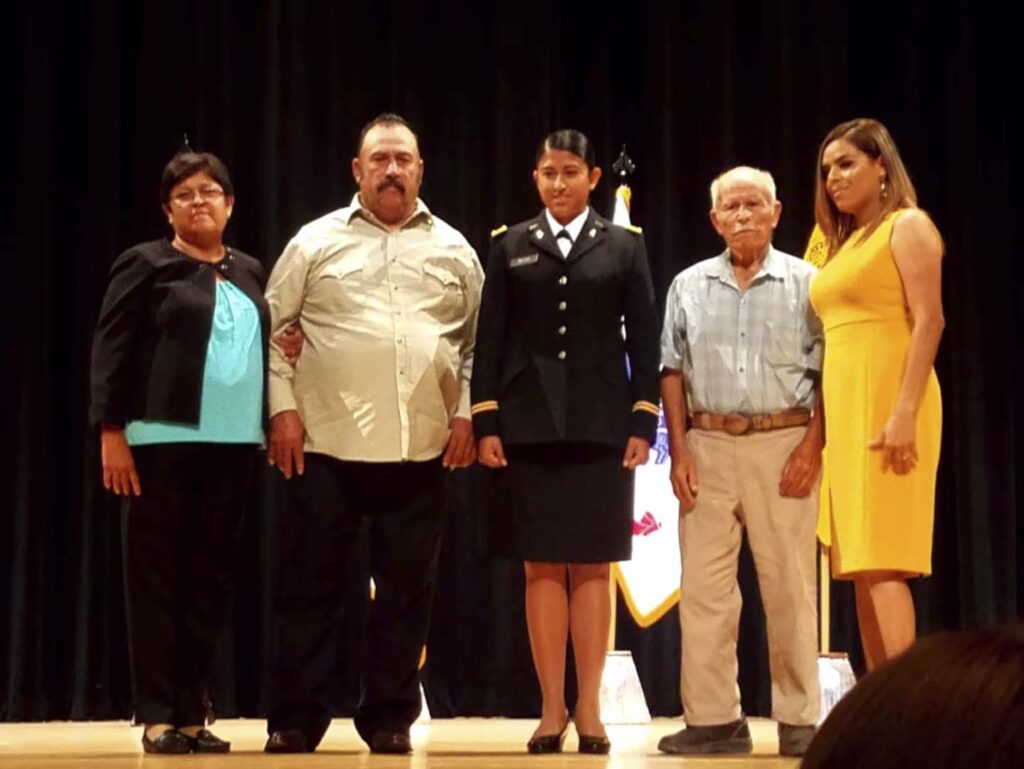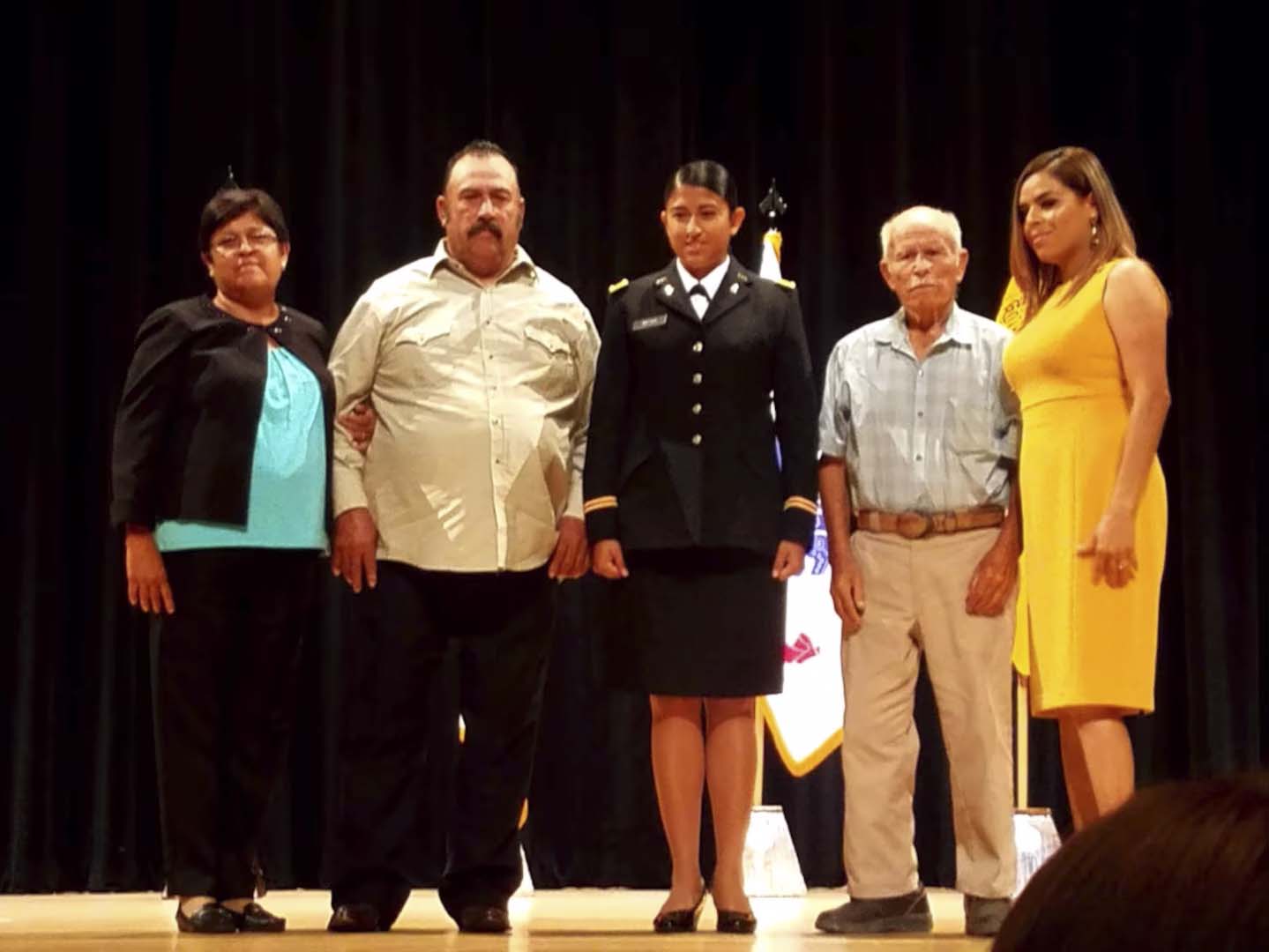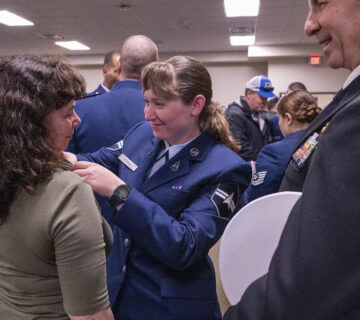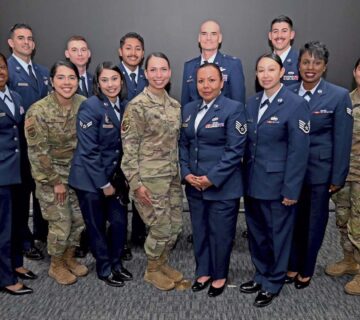Army South Mexican-American officer overcomes challenges, tragedy

U.S. Army South Public Affairs
Capt. Elizabeth Dupont, U.S. Army South G3/5 planning officer, battled her whole life for what she wanted: her athleticism, her education, and her military service, but all the challenges she faced to forge her life couldn’t compare to the trauma of losing her only child.
Despite all of the challenges she has encountered, Dupont credits her family, upbringing and Hispanic culture for her ability to continue moving forward and persevere through it all.
Immigrant farmer’s daughter
“I was born in San Juan, Texas, which is near the border,” Dupont said. “My mom had me with a midwife and then crossed to Reynosa, Mexico, and that’s where I was raised.”
Her mother, who had U.S. residency, crossed the border to give birth to Dupont, thus giving her U.S. citizenship, an opportunity her older siblings didn’t have.
The daughter of a family of farmers, Dupont is the fifth of seven siblings. She described her upbringing as humble with her mom cooking whatever vegetables they grew in their fields, and they wouldn’t often have meat.
“So, you get what you get,” she said as a matter of fact. “My siblings and I shared beds and there was no air conditioning in our house, but we didn’t know any different.”
From a young age, Dupont said her father instilled an unwavering work ethic and values that she would later come to find mirrored the Army Values.
She helped her father work the land, becoming disciplined as well as physically and mentally tough.
“I would go to school from 8 a.m. until noon, and after school and all day on the weekends I would go to work with my dad,” she said proudly. “Different vegetables, different seasons, selling the produce, we would work all year round.”
She looked at manual labor as a competition with her siblings, vying to be the best worker among them.
“Out of all of my sisters, my dad would wake me up because I wouldn’t complain,” Dupont bragged. “I mean my sisters would work, but they would get tired. I just wanted to beat them and show that I was able to do better than them in the field.”
That sparring spirit transferred over to athletics, where even after a long day of school and work, Dupont said she would find a way to play sports with her friends.
She said they played any sport they had the resources for, playing baseball or simply racing each other on foot. Of all the sports they played, she loved soccer the most.
“We would come home from work around 7 p.m., and right after that I would play soccer with my friends,” she said. “I was the one that had the ball, so they would always come look for me to play.”
Dupont said she would do everything possible to play sports or compete, like wear shorts under her school uniform just in case her friends wanted to play soccer, or even run track in her bare feet.
“My friends found out I was good at track, but most of the time I only had my uniform and girly shoes,” Dupont claimed. “So, I would just remove my shoes and run barefoot. Obviously, I was the only one who ran barefoot, but I was competing and winning!”
Moving to the U.S.
As Dupont grew older, three of her older sisters decided to move to the U.S. to attend school and work. At 14 years-old, Dupont had an opportunity to follow in their footsteps and moved to Edinburg, Texas.
“I arrived in December, in the middle of the school year, so they dropped me back one year, and then they dropped me another year because I was still learning English,” she admitted. “So, I started in eighth grade.”
Despite the two-year scholastic setback, Dupont said she took everything in stride and kept rolling along.
She became a freshman in high school and luckily had her sister, who was a senior, to help her navigate attending school in another country.
Dupont said her involvement in high school sports was a huge help for her adapting to life in Texas.
“Sports got me through the challenge of adapting to American culture because I was able to connect with other students through my athleticism,” said Dupont.
First-generation university graduate and ROTC
After overcoming the language barrier and cultural differences of moving to the U.S., she decided she wanted to pursue a college education.
She saw an opportunity to pursue her passion for coaching with a degree in kinesiology and pay for her education through the U.S. Army Reserve Officers’ Training Corps (ROTC) at the University of Texas Rio Grande Valley.
“I saw being an officer as simulating coaching but in a different spectrum,” expressed Dupont. “I didn’t want to be a normal Soldier, but rather coach the Soldiers.”
She noted that she experienced barriers due to her race, ethnicity and accent, with other cadets criticizing her pronunciation and doubting her abilities, but when it came to the physical and mental aspect of training in the ROTC program, she said she was second to none.
Dupont admitted that her humble upbringing came as an advantage, especially during the field training exercises.
“I talked to most of the other cadets and most of them said they had an easy life, but I didn’t and I’m proud of that,” remembered Dupont. “We got MREs and everyone was like, ‘What is this?’ But I just took what I could get, and when we didn’t have air conditioning, I didn’t make it a big deal.’”
Dupont graduated at the top of her ROTC class and became the first in her immediate family to receive a college degree with both an associate’s and bachelor’s degree in kinesiology and was commissioned in August of 2018 as a second lieutenant.
She went on to attend the ordnance Basic Officer Leader Course at Fort Gregg-Adams, Virginia and was stationed at Fort Bliss, Texas for her first assignment as platoon leader of the fuel and water platoon with the 501st Brigade Support Battalion, 1st Armored Brigade Combat Team, 1st Armored Division.
Unimaginable loss
Dupont met her husband, Capt. Keith Dupont II, in October of 2018 and they eventually decided to start a family.
In May of 2021 their son, Keith Dupont III, was born with a strong personality from the start, said Dupont, and she felt the purest love she had ever known.
“He was truly a baby that could light up any room with his smile and laughter,” Dupont said. “He was attentive and had a curious mind, but sleeping was not his priority for fear of missing out.”
But one night when he was about three months old, her son suddenly stopped breathing.
“He started having breath-holding spells, and his whole body would just turn blue or purple,” said Dupont with tears in her eyes. “I knew CPR and stuff so the first time it happened I started doing it, and he just gasped for air and came back.”
Dupont and her husband brought their son to several specialists to understand and treat the symptoms as the spells worsened in severity and became more frequent.
“I started to know when he was going to have the episodes because as soon as he would start to get bothered, he would have one,” recalled Dupont. “I would already be standing by the oxygen mask.”
She said that after months of searching for answers, doctors diagnosed their son with Gaucher disease.
According to the National Library of Medicine, Gaucher disease is an inherited genetic disease that affects various organ systems and tissues, including the central nervous system. There are three types which vary in the age of onset and which bodily systems they affect.
There is no cure for any of the three types, but there are treatment options for types one and three. Their son had type 2, which has no treatment.
Over the course of 17 months, Dupont said their son’s heart stopped 12 times, and each time they were able to bring him back with CPR.
But in January of 2023, their son passed away at 20 months old.
“When he passed, we were in acceptance,” she said solemnly. “We were hurting, but we knew it was best for him to not suffer anymore.”
Coping and the future
Through all of the trauma and caring for her son, Dupont was able to complete the Captain’s Career Course and be promoted to the rank of captain.
She still remembers the pain of losing Keith III but is finding ways to cope like talking with her husband, doing fun activities with him and seeing a behavioral health provider.
“It’s quite a sensitive topic still since it just recently happened, but my husband and I pull through every day,” Dupont expressed with hope. “We kind of find that little peaceful moment with a workout or going out to see a movie.”
On top of finding peace, Dupont said that putting life into perspective is important to pushing through trauma like she has experienced.
“All of this has made me stronger in the sense of just looking at things more positively,” she said. “I’m just taking it day by day, because no matter what life throws at you, you just have to adapt, continue training and just continue going.”





